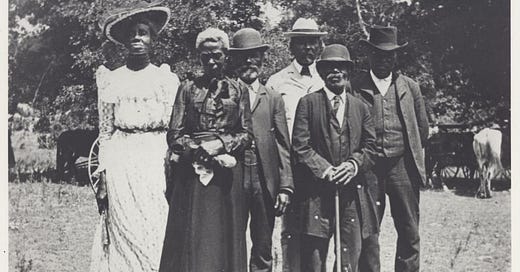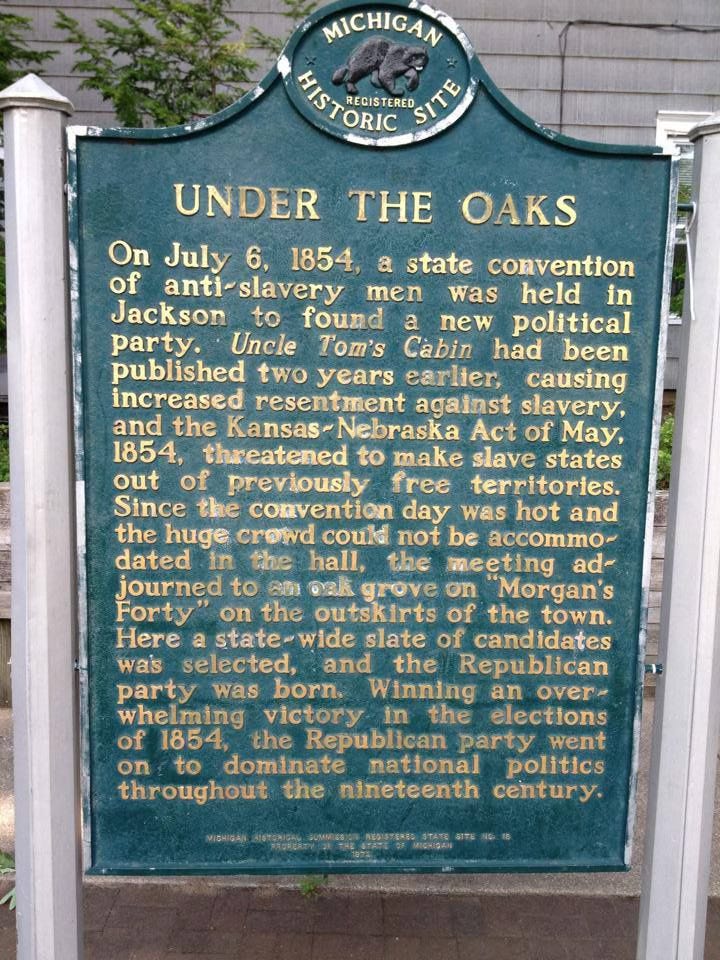Juneteenth: A Uniquely American Holiday
Many Americans dismiss Juneteenth as not being a “real holiday.” This is a mistake. Americans of all ages, colors, and backgrounds should reflect on the meaning and importance of Juneteenth.
Juneteenth is a uniquely American day of remembrance. It should be celebrated by all Americans, of all colors, ages, and walks of life, who cherish freedom and abhor slavery.
Republicans, in particular, should embrace and promote Juneteenth, which memorializes a great Republican victory. Without the Republican Party, after all, there would be no Juneteenth.
What is Juneteenth?
Juneteenth combines “June” and “Nineteenth,” commemorating June 19, 1865, when the Union Army arrived in Galveston, Texas, and U.S. Army General Gordon Granger announced to the 250,000 enslaved men, women, and children that they were slaves no more.
News of emancipation was sweet music to those in Texas who had never experienced freedom. Before Granger’s announcement, they didn't know they were free. Texas plantation managers and slave drivers had not bothered to tell them. Still, Granger’s announcement was true.
By June 1865, President Abraham Lincoln had already been dead for two months. He had died on April 15 from an assassin’s bullet. Yet, Lincoln’s Emancipation Proclamation was still in force, applying to all rebellious states, including Texas, down to the sleepy Gulf Coast town of Galveston.
Those men, women, and children who had been slaves, who were told on June 19th of their freedom, celebrated that anniversary for many years after, decades even. Over time, their families joined in celebration, and friends, and many others who simply love freedom, calling their annual remembrance “Juneteenth.”
Juneteenth celebration, June 19, 1900, held in Austin, Texas. Credit: Austin History Center.
Background
On September 22, 1862, during the Civil War, following the Union victory at Antietam, President Abraham Lincoln issued a preliminary Emancipation Proclamation, announcing that enslaved people within rebellious states would be free 100 days later:
That on the first day of January, in the year of our Lord one thousand eight hundred and sixty-three, all persons held as slaves within any State or designated part of a State, the people whereof shall then be in rebellion against the United States, shall be then, thenceforward, and forever free.
His message to Confederate states was clear: Stop the rebellion or your slaves become free.
One hundred days later, on January 1, 1863, Lincoln issued his final Emancipation Proclamation as a “necessary war measure for suppressing [the] rebellion,” which declared “all persons held as slaves” within rebel states “are, and henceforward shall be free.”
The Emancipation Proclamation, however, could not be enforced in places that remained under Confederate control. Many slaves remained enslaved, including those in the westernmost state of the Confederacy, Texas, long after Lincoln issued the Emancipation Proclamation.
Not until June 19, 1865—two and a half years later—did some 2,000 Union troops finally arrive in Galveston Bay, Texas, where the Union Army announced publicly that the enslaved people in the state had been freed by Lincoln’s Proclamation.
Making the Holiday Official
In 1979, Texas became the first state to recognize Juneteenth as a state holiday via legislation introduced by Texas State Representative Al Edwards, a Democrat. Many states followed, either adopting Juneteenth as an official holiday or memorializing it with a day of observation, including:
New York (2020): Governor Andrew Cuomo (Democrat)
Virginia (2020): Governor Ralph Northam (Democrat)
New Jersey (2020): Governor Phil Murphy (Democrat)
Pennsylvania (2020): Governor Tom Wolf (Democrat) signed legislation officially recognizing Juneteenth.
Massachusetts (2020): Governor Charlie Baker (Republican)
Oregon (2021): Governor Kate Brown (Democrat) signed legislation making it a state holiday starting in 2022.
Washington (2021): Governor Jay Inslee (Democrat)
Delaware (2021): Governor John Carney (Democrat)
Illinois (2021): Governor J.B. Pritzker (Democrat)
Connecticut (2022): Governor Ned Lamont (Democrat)
South Dakota (2022): Recognized the holiday, Governor Kristi Noem (Republican)
It’s curious that Juneteenth, a holiday made possible by the Republican Party, has been embraced by Democrats, who have actively promoted and integrated it into their party brand.
It’s been mostly Democrats honoring Juneteenth in various states. In 2021, President Joe Biden, a Democrat, signed the Juneteenth National Independence Day Act into law, making Juneteenth a federal holiday, which further spurred additional states to recognize the holiday.
Yet without the Republican Party, Lincoln never would have been elected President. Without Lincoln as President, there would have been no Emancipation Proclamation. Without the Emancipation Proclamation, there would have been no Juneteenth.
The Republican Party, when it was founded in 1854, had one dominating purpose: to stop Democrats from extending slavery across the United States and to place slavery, in the words of Lincoln, “in the course of ultimate extinction.”
Republicans like Lincoln emphasized and promoted the self-evident truths enshrined in the Declaration of Independence at the very moment influential Democrats, enamored with the settled science of their day—scientific racism and proto-eugenics—mocked and rejected those truths as self-evident lies.
In 1860, Lincoln became the first Republican elected President of the United States by dividing Democrats into internecine factions and defeating Democrat Stephen A. Douglas.
After Lincoln won, millions of Democrats refused to accept the electoral result of the Presidential election. Instead, they adopted state articles of secession, attacked the federal fort in Charleston Harbor, and launched a war against the United States.
Confederate forces bombarding Fort Sumter, Charleston, South Carolina, on April 12, 1861, in a lithograph by Currier & Ives.
In sum, while Republicans were trying to contain slavery where it already existed, stop it from spreading, and possibly abolish it, Democrats were fighting desperately to preserve slavery and let it spread into new territories, as well as the white supremacist way of life that revolved around slavery.
Fast forward to today: Democrats are quite willing to take credit for Juneteenth, and Republicans seem quite willing to let them. Democrats effectively own Juneteenth. I don’t know who is turning over in their grave more: Republican Abe Lincoln or Democrat Jeff Davis?
Juneteenth is your day to shine, Republicans. Don’t ignore it, dismiss it, or ridicule it. Embrace it. It’s your story to tell, and it is a beautiful story.
Finishing the Founding
The American Founding, usually dated from 1776 to 1787/88—from the Declaration of Independence to the Constitution—was incomplete. A nation that began by declaring “all men are created equal” could not be a coherent regime until the laws aligned with the self-evident moral truths of the Declaration of Independence. That alignment required abolishing slavery.
In just over four score and seven years, at unimaginable costs in blood, sweat, and tears, Americans did just that. In this decisive respect, I would suggest—contrary to typical scholarly accounts—that the American Founding stretched from 1776 all the way to 1865.
Juneteenth is one of three pivotal events in 1865 that represent the moral completion of the American Founding:
April 1865: Confederate General Robert E. Lee surrendered to Union General Ulysses S. Grant.
June 1865: U.S. Army General Gordon Granger arrived in the Westernmost part of the Confederacy, Texas, and announced all slaves were henceforth free people, based on Lincoln’s Emancipation Proclamation.
December 1865: Americans ratified the 13th Amendment to the United States Constitution, abolishing legalized slavery throughout the United States.
The American period spanning the Declaration of Independence in 1776 to 1865 is the greatest anti-slavery movement in all of human history. No other anti-slavery effort—anywhere, ever—comes close to what Americans did.
Never before had so many fought to their deaths and sacrificed so much to liberate others from slavery. Never before had such large numbers of people mobilized and acted politically—for the common purpose of abolishing slavery—within such a short period of time.
Classical Tragedy on an American Stage
Juneteenth is an important reminder of the drama-filled tragedy of the American story of slavery. The drama was evidenced, to borrow from Lincoln’s Second Inaugural Address, by “all the wealth piled by the bondsman’s two hundred and fifty years of unrequited toil,” as well as “every drop of blood drawn with the lash” that would be “paid by another drawn with the sword.”
The sad and sorrowful story of slavery in the United States is difficult to study. It is ugly. It is dark. It is morally repulsive. Coming to grips with just how cruel human beings can be to one another can send a person spiraling into the depths of depression. I’ve experienced that depression myself.
Within that same story, however, there is goodness. There is light. There is reason to be hopeful.
The story of the American abolition of slavery is tragic precisely because of the self-evident moral and political truths upon which America was founded. Most people throughout most of history—most cities, nations, tribes, clans, and cultures—ignored the problem by chalking slavery up as something traditional, part of the way things always had been.
Many people around the world—for millennia—didn’t think of slavery as a problem that needed to be solved. Rather, they viewed slavery as a positively good thing, a source of pride and superiority, a cultural heritage to be celebrated, spread, and perpetuated.
Americans were different.
Americans, who declared their own independence in 1776, were born into a world where slavery and slave trading were global enterprises. Everyone seemed to be in the business of slavery, whether it was Muslims and other Barbary corsairs kidnapping and enslaving southern Europeans, or Western Africans kidnapping and enslaving fellow Africans, or Europeans transporting and trading African slaves across oceans, or the many different people in Western and non-Western nations buying slaves.
Americans, however, were uniquely destined to confront the gross immorality and injustice of slavery because only the Americans declared their political independence upon the self-evident truth of universal, natural human equality. The moment they pronounced the moral logic of their own independence, slavery became a glaring, unavoidable moral problem in the newly-created United States of America, a contradiction in the logic of morals that had to be resolved.
Unlike all other previous regimes, in the United States, embracing slavery as morally right required rejecting the fundamental principles of the American regime. Embracing the principles of the American Founding required condemning slavery as fundamentally wrong, which in turn required getting rid of slavery altogether.
This contradiction could not stand forever, not in America. In most regimes, throughout most of history, there was no contradiction over slavery because the requirements of justice were simply ignored by the many.
In America, slavery had to become a problem, which reveals much about the goodness of America.
After all, unjust people living in various regimes of injustice don’t wring their hands with concern over how to abolish the unjust practice of slavery. Good people living in a regime based on the good principles of justice, do.
The result of the American Founding was the greatest, fastest, most sweeping anti-slavery movement in history. Within two generations after the Founding, Americans abolished within the United States that ugly ancient practice that had existed for thousands of years elsewhere in the world.
The tragic and triumphant story of abolishing slavery in America is a story of theory and praxis, thought and action. 1776 represents the idea of freedom. 1865 is the act of abolishing legalized slavery. That act required Lee surrendering, which happened in April 1865, and the 13th Amendment, which was ratified in December 1865. Between those pivotal historic events stands Juneteenth, a reminder for all of us that to live as an American is to live freely.









This is inspirational! We should stand proud as Americans for doing the right thing regardless of the cost. We need that same determination today!